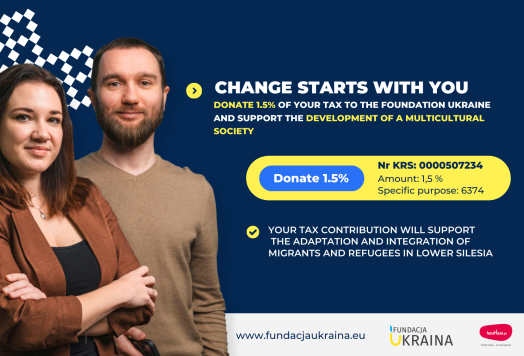The Foundation Ukraine presents candid interviews with expats from all over the world who are connected by a common experience – moving to Poland. Zuzanna Mazur, a volunteer of the Foundation, wrote about their expectations, concerns and afterthoughts in relation to life in Poland.
It is common knowledge that Poland has been getting more and more popular destination for both foreign exchange students and high school graduates. The country attracts youth mainly with low living expenses, European educational standards, and Slavic culture which is usually considered unguessed and idyllic by outlanders. However, some aren’t fully convinced of moving to Poland – they regard the Middle European regions as undeveloped and voice concerns about the rise of nationalism and intolerance within it.
There are many factors that have a profound impact on countries’ international image: stereotypes settled among societies, media coverage of crucial events, politicians’ stance on particular issues, and simply – the people’s attitude towards foreigners, their courtesy, or antipathy. Generally, we could have listed even more triggers, however, it is worth emphasizing that sometimes even a single event may account for the deterioration of a national image or, on the contrary, it can bring out the best in a state.
The inspiration for the present article came up after observation of the way individuals perceive other states and nations, and how their minds change after experiencing a real life abroad. It turns out that eventually, our initial prejudice and concerns in regard to other cultures are usually found to be inaccurate. To verify the experience of young immigrants in Poland, we attempted to carry out a survey, the result of which is the interview below. It includes the remarks of the people from various cultural circles and parts of the world to point out different perspectives regarding the life of foreigners in Poland.
The Middle East
“People seem to be interested in my religion as it is something new and different from what they know” – Mohammad from Lebanon.
Officially, Poland doesn’t seem to be welcoming for the immigrants from this region due to the panic around refugees spread by the government and public media in recent years. However, our collocutors dared to come to Wrocław and they’ve been living here for quite a long time.
Firstly, the conversation was held with Lebanese youth who has been studying at the Wrocław University of Technology since 2016. At the very beginning, he hadn’t had many positive associations with Poland – like many, he’d considered it as a post-communist country where the infrastructure is in disrepair, the government is corrupted, and so on. Nevertheless, he was lured by reasonable prices of education: “Back in Lebanon for such education that I get here I would have to pay 10 times more,” he claims. He doesn’t regret his decision because Poland turned out to be a cheap, well-developed country, and Poles “surprisingly, kind and helpful people”.
Concerning the fact that Mohammad is a Muslim, we were particularly curious about how the Polish society perceives him. When asked if he feels discriminated on account of his faith he said: “On the contrary – people seem to be interested in my religion as it something new and different from what they know.” Moreover, he appreciates that there’s an Islamic center in Wroclaw where he has an opportunity to practice his religion. Although he confided in us to experience a few racial incidents, it doesn’t bother him much because he believes that “this happens everywhere in the world.”
Mohammad admits Poland is a beautiful country with amiable people and if he had an opportunity he would stay here after graduation because “Poland is the fastest-growing economy in the EU”. However, he has some objections regarding the government sector which is responsible for not-EU-citizens affairs “The staff there (in The Voivodeship Office) usually doesn’t have great linguistic skills and it is sometimes challenging to communicate with them efficiently in English,” he complains.
“I have met some of the greatest polish people, and I’m so pleased to be met with such a heartwarming and hospitable nation” – Bana from Saudi Arabia.
The next respondent comes from Saudi Arabia and has been studying at the Political Science Department at Wrocław University. She decided to follow her sibling’s path and study in the heart of Europe. Bana recalls the whole university application process pretty well and she got encouraged by it even more: “It was also very simple and smooth, and from contacting the international office here and there I got a pretty good feeling on moving to Poland, Wroclaw especially.” Initially, she was worried about language barrier and miscommunication with the locals but having learnt basic Polish, she was able to cope with everyday things.
Moreover, she points out that nowadays, the foreign language isn’t an obstacle anymore: “ I’ve realised that some elderly spoke at least some basic English and usually the younger generations were able to hold a conversation in English as well and we’re lucky to have google translate,” she says. If it comes to the Polish people, her first guess about them was “typically very religious and traditional” which doesn’t sound optimistic at all. Nevertheless, after getting acquainted with the locals she couldn’t say a bad word about them: “I have met some of the greatest polish people, and I’m so pleased to be met with such a heartwarming and hospitable nation. […] They know how to have fun and make the people around them feel welcomed and comfortable”.
Besides the satisfaction with the society, Bana adores the Polish landscapes and nature (particularly in Zakopane) and in her opinion, the cuisine deserves its own appreciation as well. By and large, she feels very attached to the new environment: “I find myself loving everything about it, from drunk people on a Friday evening to getting called beautiful by an old lady passing me by on the street. Every country has its own culture and in Poland, I’ve realised how unpredictable its people are but overall, I’ve had such a pleasant experience so far,” she concludes.
East Asia
“People know quite many things about Korea in Poland: Samsung, Kia, Hyundai, LG, K-pop, I sometimes feel proud and grateful about it” – Park from South Korea.
At times, life writes its own scenarios and Park, who was born in South Korea, learned about it the hard way- he moved to Poland with his parents once they’d got job opportunities here. He studies and persistently tries to learn Polish so he can blend in and earn Poles’ appreciation. As yet, he is quite content with his life within the country despite the language barrier, struggles with administrative issues, and some racial jokes he occasionally has heard.
Park states that: “For sure Poland has a great living environment along with a great green environment too, at least from my point of view […] One thing which I could say I was surprised about Poland would be the price/cost of living; compared to its neighbouring country like Germany, which is known for high cost of living, Poland was really cheaper than I thought in terms of living, leisure, housing, education, etc.”. He also gives approval of the fact that the Polish young generation is interested in Korean culture and products “people know quite many things about Korea in Poland (Samsung, Kia, Hyundai, LG, K-pop) […] I sometimes feel proud and grateful about it,” he admitted.
Our Korean interviewee also wanted to stress the reason why outlanders are likely to be perceived by Poles as suspicious-looking characters: “ Poland has not had many foreigners compared to other European countries, especially from the Eastern side of the world, so it’s understandable, but yeah, it would be nice for the future if more people are better educated in Poland,” he confesses. Moreover, he shared a very precious and comprehensive proposal of the solutions to the problems that foreigners face here: “Education about worldwide culture, people, customs, etc. would be really appreciated, as it can make the lives for both Poles and foreigners much better, both in quality and quantity. And from personal experience, many foreigners including myself have hard times dealing with administrative issues regarding legal stay (karta pobytu, for instance), so if the Polish government took care of that, it would make the environment in Poland much better for the Poles and future/current foreigners,” he points out.
Western Europe
“I loved how technologically developed Poland is. You can buy tickets on the bus with your phone and even pay small sums by credit card everywhere” – Victoria from Germany.
At the very end, we wanted to get an opinion from a citizen of the Western neighbourhood country which, in comparison to Poland, is more affluent and developed in every aspect. Victoria decided to participate in Erasmus+ student exchange in Wrocław, prompted by the issue that previous interviewees have mentioned already- low cost of living, but in addition, she has been learning Slavic languages and one semester in Poland seemed to be a perfect chance to refine her skills. So how did Victoria find the place, bearing in mind that she was brought up in Germany?
Curiously enough, it turned out that Poland is one step ahead in regard to the implementation of innovations that facilitate running everyday errands: “I loved how technologically developed Poland is. You can buy tickets on the bus with your phone and even pay small sums by credit card everywhere (including bakery or post office). In Germany, It is very unusual,” she says. It was also surprising for her that most of the natives could communicate in English, at least on elementary level. Affability of Poles appealed to Victoria along with the food and cheap excursions throughout the country as well.
She only wonders why the Polish society tends to be kind of stuck in the past: “In general, it surprised me how present the 2nd World War is among Polish people. In Germany, no one who took part in National Socialism lives anymore, so the topic is of course still taught at school but has no limited relevance in our everyday life,”, she points out and we must agree it’s an accurate and often problematic topic. Moreover, she is aware of the difficult political situation and the lack of a multicultural background within the state that pose additional problems for youth who have evolved a more open-minded way of thinking and would like to liberalise the state in every dimension.
Reaching the conclusions
It was a challenge to reflect the interlocutors’ views about Poland in one article. Nevertheless, the most essential issues have been raised and we managed to capture the key points of their honest afterthoughts.
Looking at the positive aspects of Poland, all of the interviewees admitted that the country isn’t really an unadvanced place and considering technological and infrastructural development it has been gradually leveling up to the Western neighbours. The Polish culture, hospitality, food and landscapes stole the hearts of many foreigners. More and more members of the Polish society have been growing tolerant and open towards strangers due to the fact that these days they travel and interact with other cultures, study abroad, and often work in a multicultural environment. It might be tough to ask for help of elderly in Poland if you don’t know the language but most of the young Poles will be eager to communicate in English and help you out at the end. There’s no need to worry about a language barrier then.
On the other hand, Polish society shouldn’t ignore criticism which is accurate in many aspects. It is distressing that acts of xenophobia and intolerance still take place within the European country and the policy of its authorities is not conducive to the establishment of a peaceful environment. As some have noticed, the mentality of Poles which is focused on the past and victimisation, restrain the people from the search of another perspective that would be more up-to-date with the current world. Here education and bottom-up initiatives come to the assistance as it would definitely help expand the horizons of the Polish society and enable them to create a fully, outlanders-friendly environment one day. Furthermore, the improvement of the system and administration management concerning international affairs and immigrant’ issues is highly recommended by outlanders. The institutional adjustment to their needs would definitely simplify the process of obtaining, for instance, a legal residence and encourage them to stay longer within our country.
We will be glad to know your opinions about life in Poland, so feel free to join the Foundation Ukraine community on social networks to stay in touch!
Facebook: https://www.facebook.com/CUKR.Wroclaw/ and https://www.facebook.com/fundacja.ukraina/.
Instagram: https://www.instagram.com/cukr.wroclaw/
YouTube: https://www.youtube.com/channel/UCS9Afcq5gYybQwMTOvfeGXg.





